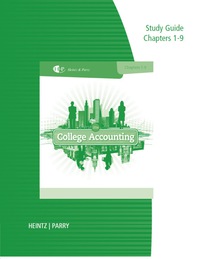Question
Entity Research Problem Daisy has developed a viable new business idea. Her idea is to design and manufacture cookware that remains cool to the touch
Entity Research Problem
Daisy has developed a viable new business idea. Her idea is to design and manufacture cookware that remains cool to the touch when in use. She has had several friends try out her prototype cookware and they have consistently given the cookware rave reviews. With this encouragement, Daisy started giving serious thought to starting up a business called Cool Touch Cookware (CTC).
Daisy understands that it will take a few years for the business to become profitable. She would like to grow her business and perhaps at some point go public or sell the business to a large retailer.
Daisy, who is single, decided to quit her full-time job so that she could focus all of her efforts on the new business. Daisy had some savings to support her for a while but she did not have any other source of income. She was able to recruit Kesha and Aryan to join her as initial equity investors in CTC. Kesha has an MBA and a law degree. Kesha was employed as a business consultant when she decided to leave that job and work with Daisy and Aryan. Keshas husband earns close to $300,000 a year as an engineer (employee). Aryan owns a very profitable used car business. Because buying and selling used cars takes all his time, he is interested in becoming only a passive investor in CTC. He wanted to get in on the ground floor because he really likes the product and believes CTC will be wildly successful. While CTC originally has three investors, Daisy and Kesha have plans to grow the business and seek more owners and capital in the future.
The three owners agreed that Daisy would contribute land and cash for a 30 percent interest in CTC, Kesha would contribute services (legal and business advisory) for the first two years for a 30 percent interest, and Aryan would contribute cash for a 40 percent interest. The plan called for Daisy and Kesha to be actively involved in managing the business while Aryan would not be. The three equity owners contributions are summarized as follows:
|
Daisy Contributed |
FMV | Adjusted Basis | Ownership Interest |
| Land (held as investment) | $120,000 | $70,000 | 30% |
| Cash | $30,000 |
|
|
|
|
|
|
|
| Kesha Contributed |
|
|
|
| Services | $150,000 |
| 30% |
|
|
|
|
|
| Aryan Contributed |
|
|
|
| Cash | $200,000 |
| 40% |
Working together, Daisy and Kesha made the following five-year income and loss projections for CTC. They anticipate the business will be profitable and that it will continue to grow after the first five years.
| Cool Touch Cookware 5-Year Income and Loss Projections
| ||||||||||||
|
With plans for Daisy and Kesha to spend a considerable amount of their time working for and managing CTC, the owners would like to develop a compensation plan that works for all parties. Down the road, they plan to have two business locations (in different cities). Daisy would take responsibility for the activities of one location and Kesha would take responsibility for the other. Finally, they would like to arrange for some performance-based financial incentives for each location.
To get the business activities started, Daisy and Kesha determined CTC would need to borrow $800,000 to purchase a building to house its manufacturing facilities and its administrative offices (at least for now). Also, in need of additional cash, Daisy and Kesha arranged to have CTC borrow $300,000 from a local bank and to borrow $200,000 cash from Aryan. CTC would pay Aryan a market rate of interest on the loan but there was no fixed date for principal repayment.
Required:
Identify significant tax and nontax issues or concerns that may differ across entity types and discuss how they are relevant to the choice of entity decision for CTC.
Use a bullet format to form your discussion. Turn in through email.
Non-Tax Issues:
| Time and cost to organize the entity |
|
| Liability protection |
|
| Initial public offering |
|
| Flexibility in Compensation |
|
Tax Issues:
| Utilization of Losses |
|
| Double Taxation |
|
| 3.8% Net Investment Tax |
|
| Special Allocations to reward owners |
|
| Self-Employment Tax |
|
Step by Step Solution
There are 3 Steps involved in it
Step: 1

Get Instant Access to Expert-Tailored Solutions
See step-by-step solutions with expert insights and AI powered tools for academic success
Step: 2

Step: 3

Ace Your Homework with AI
Get the answers you need in no time with our AI-driven, step-by-step assistance
Get Started


